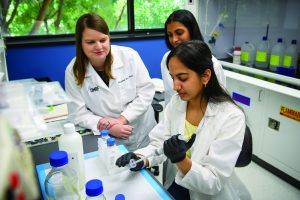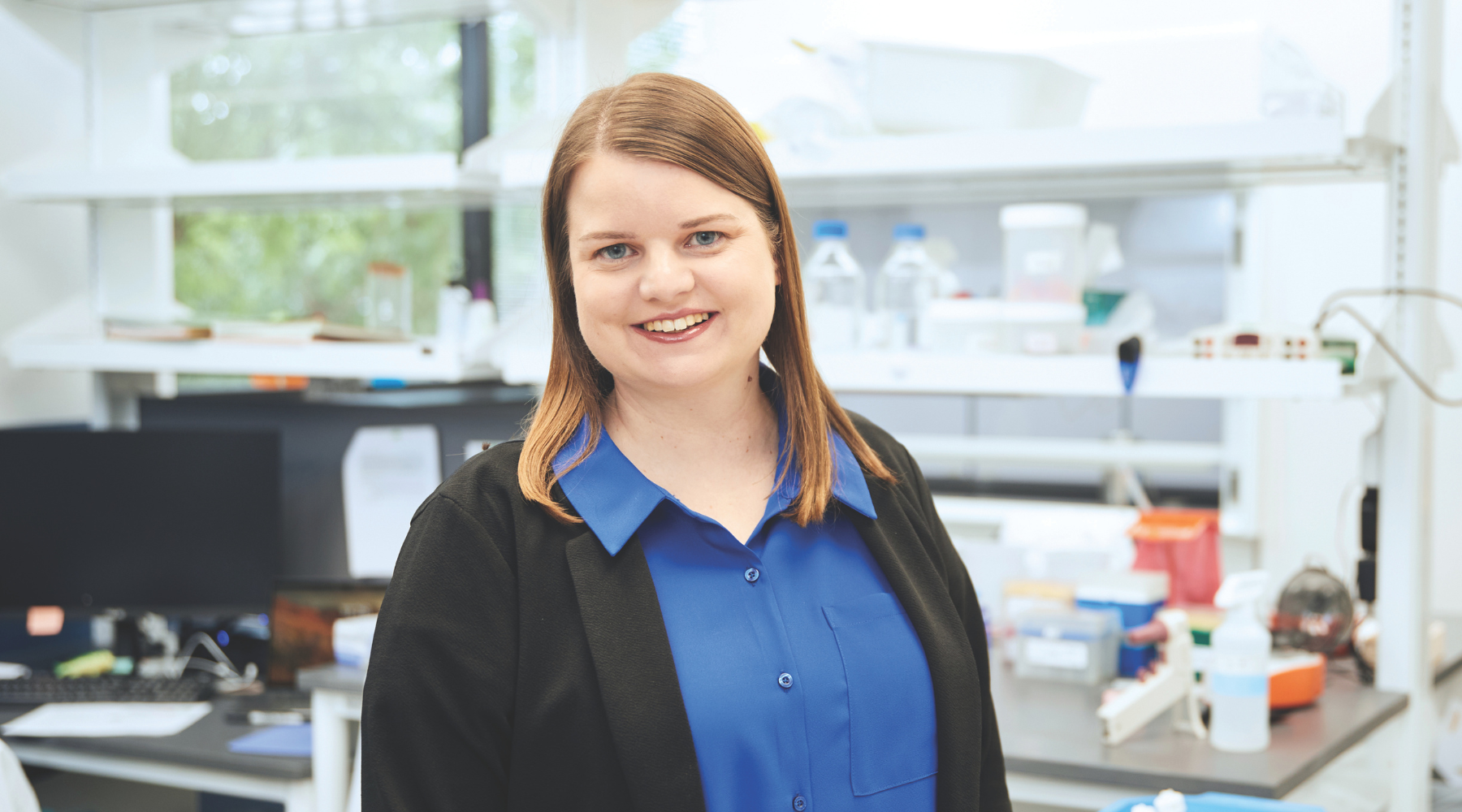by Kate Miller
Dr. Heather Rice’s return to OMRF marks the culmination of a two-decade journey
When Dr. Heather Rice looked out at the audience in Kingfisher, she saw a lot of familiar faces. “My whole family was there,” says Rice, an Alzheimer’s disease researcher who was presenting her research as part of OMRF’s 77 for 77 campaign.
Rice was born and raised in Watonga, a western Oklahoma community with a population of just over 4,000. When OMRF traveled to the area to share the foundation’s story in February of this year, she happily accepted an invitation to discuss her work, even though she’d opened her lab at OMRF a mere two months earlier. “I get a lot of motivation from sharing our science with people because, ultimately, they’re why we do what we do,” she says.
Rice also felt a special thrill in representing OMRF. The moment had been a long time coming.
In 2004, following her freshman year at the University of Oklahoma, Rice came to OMRF as a Sir Alexander Fleming Scholar, the foundation’s summer laboratory internship program for Oklahoma students. “It was the first time I ever walked into a lab or held a pipette,” she says. “It sparked my interest in understanding the brain and set me on this path.”

Rice went on to complete her bachelor’s degree at OU in zoology and biomedical sciences, and then she earned a doctorate in neurobiology at Harvard University. After completing her post-doctoral training in Belgium at VIB-KU Leuven Center for Brain and Disease Research, she returned to her home state and joined the faculty at the OU Health Sciences Center in 2019. Still, when she learned four years later that OMRF was expanding its brain research group, she leaped at the chance to return to her laboratory roots.
Dr. Benjamin Miller, who spearheaded Rice’s recruitment to the foundation, calls Rice “the perfect fit” for OMRF’s expanding efforts in neurological disease research. “We’re always trying to bring in new blood, new ideas,” says Miller, who heads OMRF’s Aging and Metabolism Research Program. “We had been aware of her work for a long time, and the environment was finally right for her research to flourish here.”
A neurobiologist, Rice studies a protein known as amyloid precursor protein that breaks down as we age, with one of the resulting fragments becoming a hallmark of Alzheimer’s disease. According to the Alzheimer’s Association, more than 6 million Americans have the disease, and that number is on the rise.
“Alzheimer’s disease is one of the most impactful diseases in our society,” Rice says. “As we age, it affects how the people we care for think and behave.”
Rice focuses on studying amyloid precursor protein before it breaks apart. “If we can define its purpose, we can better understand when something goes wrong and target that for treatment,” she says.
Last December, she hit the ground running at OMRF, opening her laboratory. “I love it here,” Rice says. “It’s really nice to be at a place where everyone has the same mission, and everyone at all levels is working toward it together.”

This past summer, life came full circle, as Rice welcomed two Fleming Scholars into her OMRF lab. “She’s perpetuating the growth of the next generation of scientists just like her,” says Dr. Ashley Cheyney, OMRF’s assistant director of scientific training and outreach. “That’s really cool.”
Rice did her best to make the experience as friction-less as possible for her two summer trainees, Meena Seshadri and Parinita Varshney.
That mentorship made all the difference for Varshney, who is beginning at the University of Texas this fall. “I was nervous before I came, and I was a little overwhelmed getting started,” she says. “But Dr. Rice created a supportive environment that turned those feelings into confidence.”
When students get their first taste of the lab, “everything can seem so difficult,” says Rice. “But I know where they’re coming from and can help when they need it.”
After all, it wasn’t that long ago she was in their shoes.
—
Read more from the Summer/Fall 2024 issue of Findings



